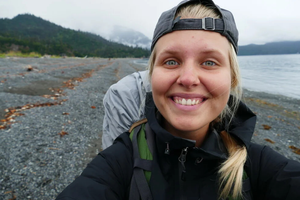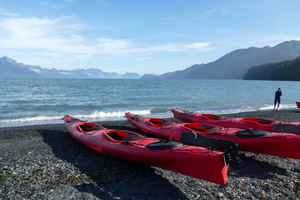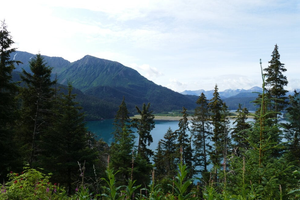Her circle of family and friends told her Alaska is dangerous, wild and cold. She did not listen and spent a month there on a budget and alone. She slept in the woods and hitch-hiked around 1,300 kilometres through this US state. She had never travelled solo before, and certainly not in such wilderness.
"In the winter, the locals often remain stuck in one place for a month, they don't even go shopping. If you don't live in big cities, of which there are relatively few in Alaska, you live a very isolated life. There is no radio or television, and the service is unavailable in some places, people receive mail in mailboxes even five kilometres from where they live. However, they live a slow, beautiful life," describes traveller KAMILA DULOVÁ.
She knows that travelling alone may not always be safe for women. She herself has experienced unpleasant situations, but she does not want to be discouraged. "I also hear opinions about a woman travelling alone, but why should men have the right to do so and women be afraid? I also want to go on an adventure," she says.
What made you want to go to Alaska, when people close to you were telling you of all the dangerous things that could happen to you?
It's true that when I bought the flight ticket, I felt an adrenaline rush. I thought to myself that it was a wonderful opportunity to see something different, since I had not been to mountains outside of Slovakia until then. I had never even seen such a wilderness and I had never hiked alone. After a year of working as an au pair in the US I took a month to travel. Alaska is quite inaccessible from Europe and flights are expensive, so I thought why not take advantage of that when I was closer. I wanted a unique experience and maybe even subconsciously I wanted to prove something.
You went to Alaska without any experience?
Yes. I had never been anywhere alone like this before. So I tried to convince some friends to go with me, but the plane tickets were very expensive for them.
What did you find there?
I didn't experience anything like what I warned about. I guess I was lucky, because hitch-hiking can be risky and it's not unusual to meet bears in Alaska. Once the locals I was consulting with sent me on a trail that was marked only with wooden arrows. One lady wrote where to turn left, where to turn right, when to go straight on a piece of paper. I was also lucky to meet good people.
You spent nights in the wilderness, among animals. How did you prepare for that?
When I look at it now, it sounds terrible, because I didn't prepare. I didn't think so much about the risk, as I did mainly about the fact that it would be a great experience. I once ended up on a peninsula that could only be reached by water taxi. I got out, the boat left and I was alone. There were maybe a few towns along the coast, but deeper in the forest there was no service.
I spent the night at a glacial lake. The trail was about eight kilometres long, not difficult, but there were warnings everywhere two days before that bears in the area were being scared away by helicopter. I didn't sleep the whole night or maybe only in short intervals, because I every rustle woke me up. I didn't even have bear spray. The thought didn't occur to me.
Did you see any bears?
I saw a grizzly, but I wasn't in danger. It was during an organised hike in Denali National Park with a ranger. On the way back from the hike, we saw the bear, but from quite a distance.
What about other animals? After all, Alaska is not just populated with bears.
Fortunately, I only encountered mountain goats or other smaller animals. In fact, the locals say that bears are really not the worst thing you can encounter. Moose are said to be even more dangerous and may attack humans. For example, I was advised to hide behind a tree if necessary, because moose perceive the landscape around them differently and they will not attack me if I hide like that.
Does a person need to be physically fit to survive in the wilderness and the cold?


 Kamila Dulová. (source: SME - Jozef Jakubčo)
Kamila Dulová. (source: SME - Jozef Jakubčo)


